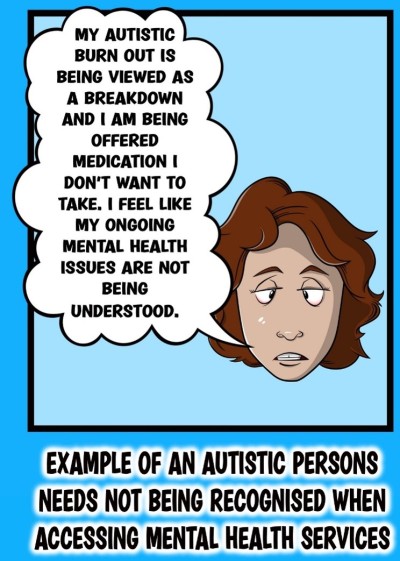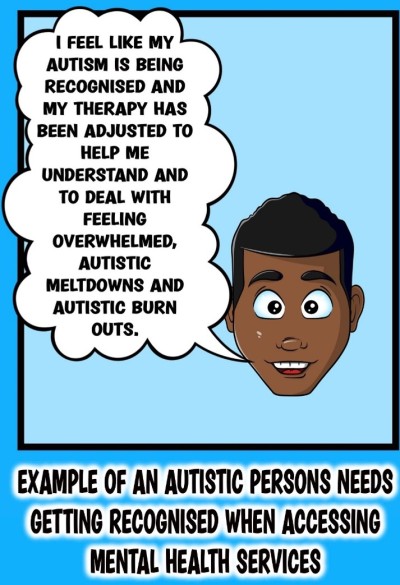Use the 'next' button to view the Autism Strategy page by page.
Improving autistic children and young people’s access to education, and supporting positive transitions into adulthood

In this section we have included examples by Autistic Minds to help illustrate the barriers autistic people face when accessing mental health services.
Later in this section we discuss:
- Themes, feedback and suggestions raised by people during our review
- Our commitments to deliver this aim
- How we will work towards our aim within CWP between 2022-2027
- How we will work towards our aim with partners between 2022-2027
‘Sensory Joy’ Artwork by Helen Boyle
|
Building the right support in the community and supporting people in inpatient care |
|
|
Example of an autistic persons needs not being recognised when accessing mental health services:  "My autistic burnout is being viewed as a breakdown and I am being offered medication I don't want to take. I feel like my ongoing mental health issues are not being understood." |
Example of an autistic persons needs getting recognised when accessing mental health services:
 "I feel like my autism is being recognised on my therapy has been adjusted to help me understand and to deal with feeling overwhelmed, autistic meltdowns and autistic burnouts." |
|
Cindy is feeling frustrated that her autistic traits are not being recognised and medication is being offered instead of adhering to the STAMP STOMP initiative. This has left her feeling hopeless. |
Jacob is feeling hopeful for the future knowing that medication is offered as part of a wide range of his treatment options. he feels listened to by his clinicians and support workers. They involve him indecisions about his treatment. Currently Jacob is doing group DBT skills and enjoys engaging in a local green gym to support his well-being. |
|
Themes, feedback and suggestions raised by people during our review: Workforce development Comments received relate directly to the section under Theme 1 and were around:
Quality of service provision and delivery Repeating your story
Person-centred care
Autism and co-morbidities
Complexity pathways to support described as complex and difficult to navigate
Working with partners and stakeholders
|
|
Our commitments to deliver this aim Workforce development Please refer to our commitments under Aim 1: improving understanding and acceptance of autism within society. Quality of Service Provision and Delivery We will continue our focus to deliver support in the community wherever it is safe and appropriate to do so.
We will continue our work to improve crisis prevention and reduce avoidable admission into inpatient settings for autistic people.
Where people are admitted, we will improve the quality of their care and their experience.
We will ensure that restrictive practice is used as a last resort.
We will continue to reduce the use of psychotropic medication in line with the STOMP-STAMP national programme.
Please note that we have aims under Theme 4 addressing the environmental needs for autistic people which relate to both community and inpatient settings. Working with partners and stakeholders We will work with partners across the system to identify people at risk of admission earlier and wrapping support around them.
Working with commissioners, we will implement the government’s key worker programme for children and young people with complex needs in inpatient mental health settings.
Where people are admitted, we will work with partners to facilitate timely, appropriate and safe discharge.
|
How we will work towards our aim within CWP between 2022-2027:
Workforce development
Our Theme 1 actions will support improved quality of care through workforce development
Quality of Service Provision and Delivery
- We will recruit key workers for children and young people with complex needs in inpatient mental health settings in line with local commissioning guidance.
- We will deliver additional senior clinical leadership to teams supporting young adults with complex co-morbid presentations to reduce the likelihood of admission or to support a reduced length of inpatient stay.
- We will broaden our use of needs stratification approaches (adapting models such as Dynamic Support) across all our mental health services to identify autistic people at risk of admission early.
- We will continue and extend (for adult Mental Health services) our Intensive Support offer which aims at reducing avoidable inpatient admission by providing additional community-based support.
- We will continue to review the use of psychotropic medication for all autistic people, implementing the STOMP-STAMP programme to reduce its over-use.
- We will continue to monitor our use of restrictive practice in line with the recommendations of the CQC Out of Sight, Who Cares? report and the Mental Health Units (Use of Force) Act.
Our Theme 4 actions will support improve quality of care in relation to pathways and environment.
How we will work towards our aim with partners between 2022-2027:
Working with partners and stakeholders
We will participate with system partners in Community Care, (Education) and Treatment Reviews to wrap support around people identified as at risk of admission earlier. We note that the Mental Health Act White Paper proposes to put these Reviews on a statutory footing.
As a system partner, we will advocate for expansion of the autism hub model, so that autistic people can share experiences, deliver peer support (including peer mentors) and create more talking café opportunities.
Working with our system partners, we will support timely discharge by providing expert advice and information to inform person-centred care planning prior to discharge.
Where appropriate and in agreement with commissioners, we will provide in-reach opportunities for community care providers to get to know individuals and their needs prior to discharge (planned transition period).
Our Intensive Support offers can also support discharge in the community, as appropriate.